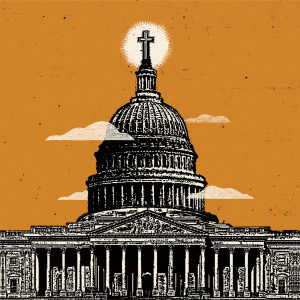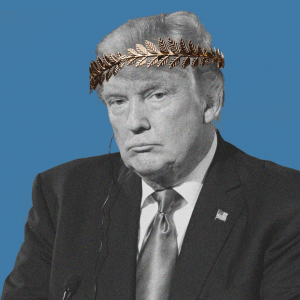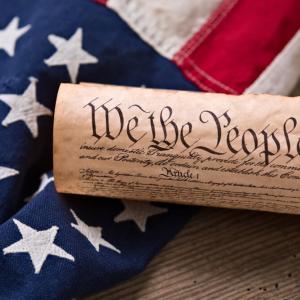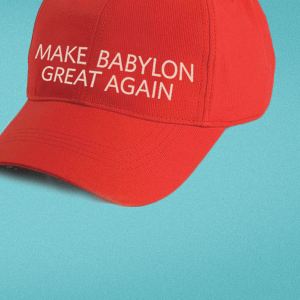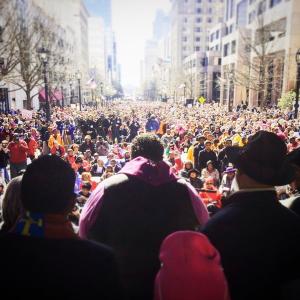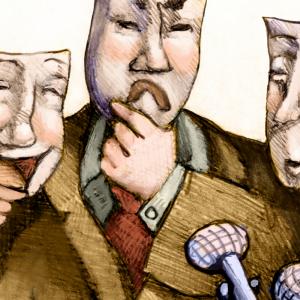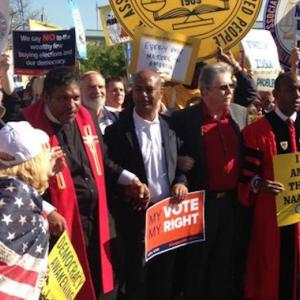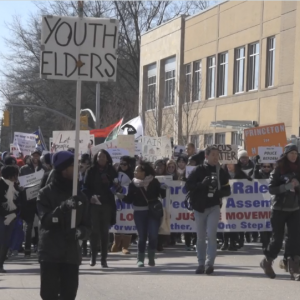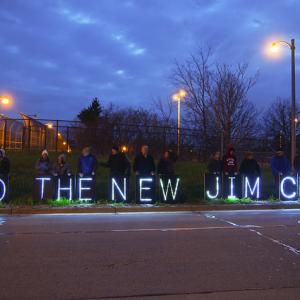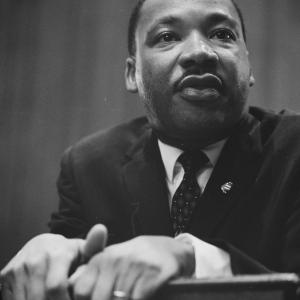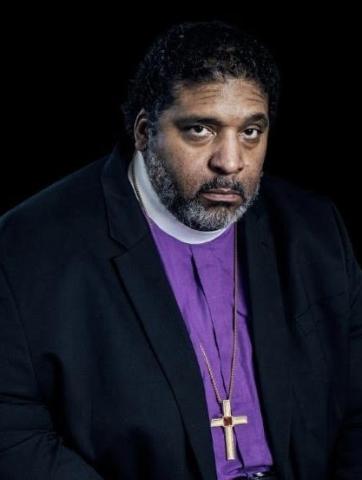
Bishop William J. Barber II is president and senior lecturer of Repairers of the Breach, bishop with The Fellowship of Affirming Ministries, executive board member of the Christian Church Disciples of Christ, and professor in the practice of public theology and public policy and founding director of the Center for Public Theology and Public Policy at Yale Divinity School. He is also co-chair of the Poor People's Campaign: A National Call For Moral Revival, and a Kettering Foundation senior fellow.
He is the author of five books: We Are Called To Be A Movement; Revive Us Again: Vision and Action in Moral Organizing; The Third Reconstruction: Moral Mondays, Fusion Politics, and The Rise of a New Justice Movement; and Forward Together: A Moral Message For The Nation. His latest book, White Poverty: How Exposing Myths About Race and Class Can Reconstruct American Democracy, was released in June 2024.
Bishop Barber served as senior pastor of Greenleaf Christian Church, Disciples of Christ for thirty years and as president of the North Carolina NAACP from 2006-2017 and on the National NAACP Board of Directors from 2008-2020. He is the architect of the Forward Together Moral Movement that gained national acclaim in 2013 with its Moral Monday protests at the North Carolina General Assembly. In 2015, he established Repairers of the Breach to train communities in moral movement building through the Moral Political Organizing Leadership Institute and Summit Trainings (MPOLIS). In 2018, he co-anchored the relaunch of the Pour People's Campaign: A National Call for Moral Revival — reviving the 1968 Poor People's Campaign organized by women's rights movement, Rev. Martin Luther King Jr., worker's rights movement, religious leaders, and people of all races to fight poverty in the U.S. As a moral leader, Barber engages in nonviolent civil disobedience and has been arrested more than 15 times in various states standing up with those who have been marginalized by systematic racism, poverty, and injustice.
A highly sought-after speaker, Barber has given keynote addresses at hundreds of national and state conferences, including the 2016 Democratic National Convention, one of few preachers in nations history to be invited to give the homily at the 59th Inaugural Prayer Service for President Joe Biden and Vice President Kamala Harris, the Vatican at Pope Francis's encyclical Laudato Si': On Care for Our Common Home and the Pontifical Academy of Social Sciences. In June 2018, he addressed the 5th Uni Global Union World Congress to more than 25 countries.
Barber is regularly featured in media outlets such as MSNBC, CNN, NNPA, the New York Times, Washington Post, and The Nation magazine. He was named one of 2020's BET 100 Entertainers and Innovators and one of the 2019 recipients of the North Carolina Award, the state's highest civilian honor.
Barber has had 12 honorary doctorate degrees conferred upon him. He earned a high school degree from Plymouth High, a bachelor’s degree from North Carolina Central University, a master of divinity from Duke University, and a doctorate from Drew University with a concentration in public policy and pastoral care. He has studied in a special fellowship at MIT.
Posts By This Author
How Christians Can Counter Christian Nationalism
Scholars, pastors, and activists on hopeful action to undo this heretical belief system.
WEAPONIZED CHRISTIAN NATIONALISM seeks a “Christian” government that would erode civil rights and undercut election integrity and democratic principles. It endorses the use of violence to obtain or maintain power; embraces white supremacy; and distorts Christian language, symbols, and identity into tools for political manipulation and gain.
At the same time, beliefs about “God and country” exist on a wide spectrum. White Christian nationalism is sometimes supported by people who are not white. And stifling all participation by people of faith in public life is not a suitable alternative to nationalism.
In other words: It’s complicated. You’re not alone if you are confused, concerned, or dismayed by these topics. But hopeful action is possible. The following short essays by scholars, pastors, and activists offer insights on Christian nationalism and how to dismantle it. —The Editors
Prophetic Faith
by William J. Barber III
IF FAITH WERE not powerful, people in power would not invest so much to manipulate it for their own interests. When we oppose Christian nationalism, we must begin with a recognition of the power of faith.
Faith has the power to bring us together and build up a democracy where everyone can thrive. Every movement toward a more perfect union in our nation’s past has been powered and sustained by deep faith traditions. We need to learn from the faith of Frederick Douglass, Sojourner Truth, and William Lloyd Garrison; Martin Luther King Jr., Dorothy Day, and Ella Baker. This rich theological heritage helps us guard against the forces that distort Christianity to justify extremism. But it also prepares us to practice prophetic faith in our own lives and ministries.
“Woe unto you who legislate evil and rob the poor of their right,” the prophet Isaiah declares. In his first sermon, recorded in Luke 4, Jesus takes up Isaiah’s scroll to proclaim “good news to the poor.” Any alternative to the religious nationalism that calls itself “Christian” must embody this prophetic proclamation for the 135 million Americans who are poor or low-income today. As the divide between the super-rich and the poor has grown wider in the U.S. over the past half century, poor communities have been offered divisive culture wars and the false hope of an individualistic prosperity gospel.
In a time of extreme inequality, Ezekiel says God looked for someone to stand in the gap but found none. Several chapters later, though, God sends Ezekiel to prophesy to a valley of dry bones. There Ezekiel witnesses the power the rejected have when they come together and rise up as a nonviolent army.
Poor people in the United States today are the largest swing vote in national elections. If they unite around an agenda, they have the power to reconstruct American democracy. God has seen fit to ordain those who have been rejected in this world to lead the revival of love, justice, and mercy that we so desperately need. We embody an alternative to religious nationalism when we join God in this work.
America's Wannabe Caesar
Trump’s daily press briefings resemble the kind of public idolatry that ancient Caesars engaged in.
We Must Go Beyond Trump and Reconstruct Our Democracy
In the richest nation in the history of the world, 140 million Americans are poor or low income — one emergency away from not being able to meet their basic needs. We cannot be distracted by arguments about which president or party in recent history had more quarters with over 4 percent economic growth while Congress seriously considers cuts to programs like the Supplemental Nutrition Assistance Program (SNAP) and the Children’s Health Insurance Program (CHIP). Donald Trump is not on the ballot this November, but the fate of poor people in America certainly is. In state legislature and congressional races, we must ask ourselves which candidates are willing to challenge the lies that keep millions of our neighbors in poverty.
We Will Not Bow Down
Tips from the book of Daniel for dealing with a tyrant.
IN THE BOOK of Daniel, you find the words, “Can the God you serve deliver you?” Here’s the truth: The God we serve can deliver. But even if not, we will never bow down and serve other gods.
Daniel, set during the Babylonian exile, has something to say about history. It explores the vulnerability of people living under oppression. Many of the Israelites found themselves in bondage in Babylon.
There was a king of Babylon named Nebuchadnezzar. He was a mighty king, and when he issued an order, he meant business. Nebuchadnezzar was a narcissistic maniac who made everything about him. He made a golden tower, and he ordered that everybody under the reign of his kingship had to bow.
One day, Nebuchadnezzar called in those he had appointed and the ones he had pardoned, the governors and the sheriffs. He had a dedicatory service for his golden image, and he was trying to make sure that he wouldn’t have to lie about those who attended his inauguration.
Shadrach, Meshach, and Abednego, three young Hebrew men, represent the choices faced by those who must either support a repressive regime or face certain death. Nebuchadnezzar wanted them to bow—forget their heritage, forget their legacy, forget their journey, forget their God, forget their rights, and bow down. He wanted everyone around him to feel less than him, because he had his own inferiority complex.
The name Nebuchadnezzar literally means “one who will do anything to protect his power.” That’s why Nebuchadnezzar built his towers. He built his tower more than 10 stories tall. Nebuchadnezzar put his name on his tower. Everything he built, he put his name on it, because he was a narcissistic maniac. And then he put gold on his tower, and he promised that he, and only he, could make Babylon great again.
In North Carolina, the March Against Extreme Policies Is Working
On Feb. 11, more than 80,000 people gathered in Raleigh, N.C., for the largest Moral Monday march yet — challenging Trumpism in Washington, D.C., and legislative overreach in our state. More important than the numbers, though, are people’s convictions: Principle, not party, is the reason why we march. We march because our deepest religious traditions have trained our bodies to stand up in the face of injustice.
Decrying Hypocrisy Is Not Enough
After a year of verbal brutality, racially charged speeches, and regressive policy proposals, Trump attended a black church in an effort to convince African Americans he is not racist. His trip to Detroit with Ben Carson was the photo op that such an effort demands. Though he was shrewd enough not to say the words, the whole spectacle was designed to say, “some of my best friends are black.”
When Politicians Appeal to White Rage
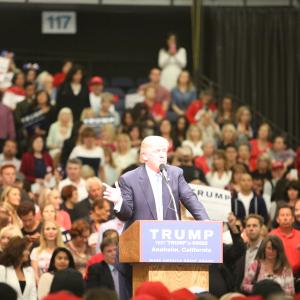
Donald Trump speaks at a campaign event in Anaheim, Calif., on May 25. mikeledray / Shutterstock.com
Stopping on the campaign trail in Wilmington, N.C., Republican presidential candidate Donald Trump suggested that violence might be the only way to stop Hillary Clinton. He spent the following day basking in the shock value of his words while maintaining that he’d been misunderstood. I’m not sure Mr. Trump understands the demons he has unleashed, but Wilmington is a good place to learn.
Subverting Democracy Is Not Partisan. It Is Immoral.
Activists Speak Out on N.C.'s 'Racially Discriminatory' Voter ID Law, Struck Down Last Week
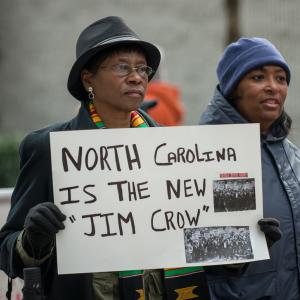
Moral March in Raleigh, N.C., in Februar 2014. EPG_EuroPhotoGraphics / Shutterstock.com
Since the summer of 2013, we have called this law — which the 4th Circuit struck down on Friday — a monster voter suppression bill. It was the first and the worst of many voter suppression measures to pass through state houses since the Supreme Court’s Shelby decision stripped the Voting Rights Act of its power to guarantee fair elections in this country. In many ways, it performed the new Southern Strategy of James Crow, Esq., which attempts to hold onto power as white voters become one among many minorities in this country. It is a strategy that necessarily depends on old fears, racism, and divide-and-conquer tactics.
Turning Tears Into Righteous Indignation

Image via Jaromir Chalabala / Shutterstock.com
Let’s prosecute these police officers fair but hard because the shooting of innocent Black men and women is done in our names. Until there are consequences this will only continue.
Orlando Massacre: We Cannot Let Hate Have the Last Word
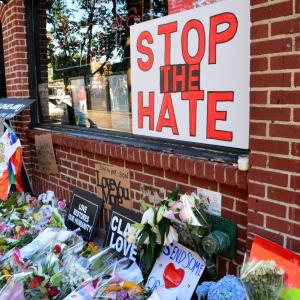
Memorial for Orlando victims outside the landmark Stonewall Inn in New York City. Christopher Penler / Shutterstock.com
But while we cry, we must also gain our composure and not allow hate or cynicism to have the first, the loudest, or the last word.
We cannot use hate as the path through our pain into our tomorrow. Hate fuels hate: racial hate, homophobic hate, religious hate, class hate, and the rhetoric of hate that drives the terrorist and the mob. The culture of hate creates the actions of hate. It is and always has been a recipe for murder.
Rev. William Barber: Here's Why I Got Arrested
Today is the first time I have ever been arrested in Washington, D.C. I came for the same reason Southern political leaders petitioned President Grant to send troops in the 1870s — for the same reason Dr. King called upon Presidents Kennedy and Johnson to enforce federal law in the 1960s. I came because the interposition and nullification of extremists is blocking a Third Reconstruction in America today.
The Racism Lurking Behind N.C.’s Anti-LGBT Law
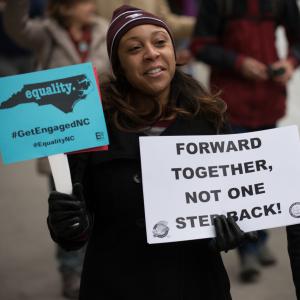
2014 Moral March in Raleigh, N.C. EPG_EuroPhotoGraphics / Shutterstock.com
Meeting for a one-day emergency session last week, North Carolina’s General Assembly passed HB2, which has been widely criticized as the nation’s worst anti-LGBT bill. In supposed defense of the general welfare, conservative lawmakers moved to stop a Charlotte ordinance that would have allowed transgender citizens to use public restrooms of the gender with which they identify. But their call to “protect our women and children” echoes language of the white supremacy campaign that overthrew local governments in this state 120 years ago. Both then and now, the call to defend families against imagined predators is a crude power grab.
Why It's Possible to Reject the Klan and Still Support Racism
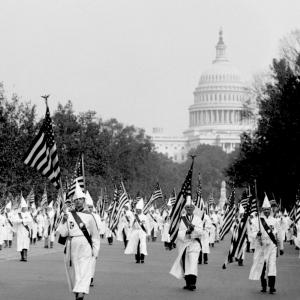
Ku Klux Klan parade in Washington D.C. in 1926. Everett Historical / Shutterstock.com
If Donald Trump is telling the truth, he only recently learned that David Duke, former Grand Wizard of the Ku Klux Klan, is an avowed segregationist. Apparently, the KKK and its history have faded from many white Americans’ memory. Jeffrey Lord argued on national television this week that the Klan is an invention of “the left.” As native sons of the South, we could forgive these men their ignorance. (“Bless their hearts. They ain’t from around here,” is the polite way to say it.) But we can neither forgive nor ignore the way 400 years of white supremacy have been naively reduced to whether a candidate will disavow the support of a hate group leader. Racism lives on in policies that perpetuate racial disparities, with or without the KKK.
A Moral Movement to Hold Candidates Accountable
This tenth annual People’s Assembly was made up of black, white, and brown, gay and straight, rich and poor, labor and civil rights, Democrats, Republicans, and Independents, people of faith and people whose moral visions are rooted in reason or politics. Planned Parenthood advocates marched in pink hats alongside evangelicals, singing the same freedom songs. Black Lives Matter activists linked arms with elderly white veterans. The Moral March did not rally around a messiah candidate but challenged all leaders to serve the common good with policies that are morally sound, constitutionally consistent, and economically sane. While a kaleidoscope of campaigns vie for everybody’s attention, this long-term, grassroots coalition to reconstruct democracy in America is a movement to hold all candidates accountable.
The Second Career of James Crow, Esq.
Our lawyers have made a strong case this week that the voter ID component of this legislation places an unnecessary and undue burden on voters — especially poor and African-American voters. We will ultimately win this fight in the courts. But this case is about much more than defeating voter ID laws. It is about a central question of 21st-century American politics: is a multiethnic democracy possible?
We Killed a Prophet in 1968. Will We Do It Again?
Jewish scholar Abraham Joshua Heschel introduced Martin Luther King, Jr. to a rabbinical assembly in 1968, “a voice, a vision, and a way.”
“The whole future of America will depend on the impact and influence of Dr. King,” Heschel said.
Grieving the Past Before Beginning a New Year
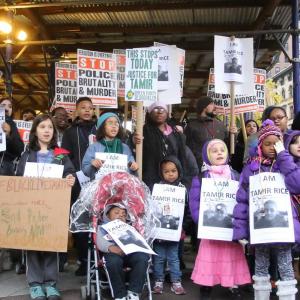
New York City march on the anniversary of Tamir Rice's death. a katz / Shutterstock.com
Black people’s humanity is still at question in the stories so many of us hear and tell in America. For many with a badge, a gun, and the legal shield of the state, black men and women — even black children — are not humans. Instead black bodies are threats and targets for rage, fear, and racially justified execution. When an officer of the law exterminates on the spot, we must ask ourselves what he was shooting. In his mind, Tamir could not have been a boy. He could not have been human. What did he see? And who bewitched him (and us) to “see things” when we are entirely sober?
A Politics Beyond Fear
The Value of Fusion Friendships
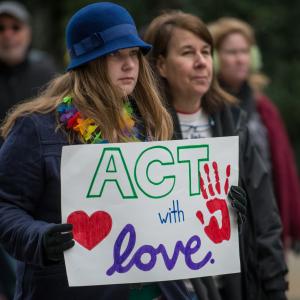
Moral Mondays March in Raleigh, N.C. on Feb. 8, 2014. EPG_EuroPhotoGraphics / Shutterstock.com
Since the Republican presidential front-runner announced after San Bernardino that he would close America’s borders to Muslims, a debate has ensued about what “radicalization” means and how far we as a nation are willing to go to protect ourselves from it. So-called liberals (and even some in the Republican party’s mainstream) have said, “Not all Muslims have been radicalized.” To this Donald Trump retorts, “Until we know which ones have been, let’s keep them all out.” The unquestioned consensus in America’s public square is that we can only be safe by figuring out who the un-American terrorists are and getting rid of them.
But where we're from in North Carolina, we should not be so naïve. We have a disproportionate share of homegrown terrorists.
Raising Our Moral Voices With Pope Francis
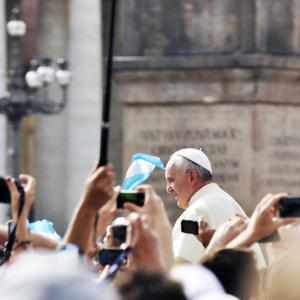
Image via Savvapanf Photo / Shutterstock
As one human family, it’s time to raise our moral voices.
As Pope Francis has illustrated, true faith is not a disengagement from the challenges of the world but an embrace of those very challenges.
The truth is there is no gospel that is not social; no gospel that relieves us of our call to love our neighbors as ourselves; no gospel that lives outside God’s admonition to serve the least of these. Pope Francis has made this clear, and for that we thank him.
In the history of the United States, a moral critique has always been at the center of any challenge to the structural sins of society—slavery, the denial of women’s rights, the denial of labor rights, the denial of equal protection under the law, the denial of voting rights, and the promulgation of unchecked militarism. We have never overcome any of these evils without a moral critique that challenged their grip on the heart and imagination of our society.
Will Evangelicals Welcome Pope Francis? The Good News Depends on It
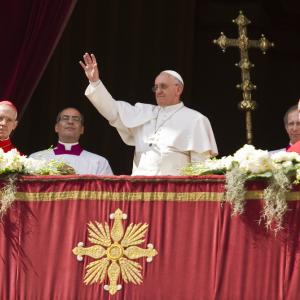
Pope Francis on Easter Sunday 2013 in St. Peter's Square at the Vatican. Photo via Philip Chidell / Shutterstock.com
As evangelical preachers in the American South, we’re excited to welcome our brother, Pope Francis, to the U.S.
We want to be explicit in our evangelical welcome because so many who claim to be evangelical are criticizing the pope for being political and not preaching orthodox theology.
